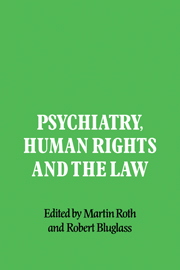Book contents
- Frontmatter
- Contents
- Editors' preface
- Contributors
- The historical background: the past 25 years since the Mental Health Act of 1959
- The social and medical consequences of recent legal reforms of mental health law in the USA: the criminalization of mental disorder
- The recent Mental Health Act in the United Kingdom: issues and perspectives
- Medical and social consequences of the Italian Psychiatric Care Act of 1978
- Lessons for the future drawn from United States legislation and experience
- Recent developments in relation to mental health and the law in the Federal Republic of Germany
- Psychopathy and dangerousness
- Dangerousness in social perspective
- Psychiatric explanations as excuses
- Detention of patients: administrative problems facing Mental Health Review Tribunals
- Developments in forensic psychiatry services in the National Health Service
- The role of psychiatry in prisons and ‘the right to punishment’
- Human rights in mental health
- Changes in mental health legislation as indicators of changing values and policies
- The Danish experience: one model of psychiatric testimony to courts of law
- A postscript on the discussions at the Cambridge Conference on Society, Psychiatry and the Law
Human rights in mental health
Published online by Cambridge University Press: 04 August 2010
- Frontmatter
- Contents
- Editors' preface
- Contributors
- The historical background: the past 25 years since the Mental Health Act of 1959
- The social and medical consequences of recent legal reforms of mental health law in the USA: the criminalization of mental disorder
- The recent Mental Health Act in the United Kingdom: issues and perspectives
- Medical and social consequences of the Italian Psychiatric Care Act of 1978
- Lessons for the future drawn from United States legislation and experience
- Recent developments in relation to mental health and the law in the Federal Republic of Germany
- Psychopathy and dangerousness
- Dangerousness in social perspective
- Psychiatric explanations as excuses
- Detention of patients: administrative problems facing Mental Health Review Tribunals
- Developments in forensic psychiatry services in the National Health Service
- The role of psychiatry in prisons and ‘the right to punishment’
- Human rights in mental health
- Changes in mental health legislation as indicators of changing values and policies
- The Danish experience: one model of psychiatric testimony to courts of law
- A postscript on the discussions at the Cambridge Conference on Society, Psychiatry and the Law
Summary
Some years ago there was an action brought against a medical man for allegedly signing an order for the detention of a patient, and since then a great many medical men have refused to sign orders for admission into an asylum. It appears to me that there should be some relief to medical men … that you must prove malice before you can punish for any action of that sort.
(Sir Trevor Lawrence, 1877)The opinion of any medical practitioner shall not be admissible as evidence of the insanity of a person.
(An amendment tabled to the Lunacy Regulations Bill 1845 by Montague Smith, MP)The relativistic nature of human rights in mental health
Both lawyers and psychiatrists have traditionally presumed that their approach to mental health is in the person's interests (Gostin, 1983(2, b). In any discussion of the ‘human rights’ of mentally disordered people it is important to examine the term. A human right is no more than an entitlement due – legally or morally – to a human being. If we construe the term to mean a statutory right, it takes us no further, for it is one which government can choose whether or not to legislate for a particular group. A statutory right has no constancy and will deviate over time and across national boundaries. To most of us a human right suggests some permanence: for example, the right not to use medicine for political purposes.
- Type
- Chapter
- Information
- Psychiatry, Human Rights and the Law , pp. 148 - 155Publisher: Cambridge University PressPrint publication year: 1985
- 2
- Cited by



